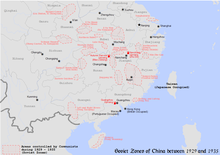
Back Aixecament de Nanchang Catalan Nančchangské povstání Czech Nanchang-Aufstand German Nanĉana Ribelo Esperanto Revuelta de Nanchang Spanish Nanchangeko Matxinada Basque Soulèvement de Nanchang French 南昌起義 GAN התקוממות נאנצ'אנג HE Pemberontakan Nanchang ID
This article includes a list of general references, but it lacks sufficient corresponding inline citations. (July 2011) |
| Nanchang uprising | |||||||
|---|---|---|---|---|---|---|---|
| Part of Chinese Civil War | |||||||
 Location of the Nanchang uprising | |||||||
| |||||||
| Belligerents | |||||||
|
| ||||||
| Commanders and leaders | |||||||
| Nanchang uprising | |||||||||||||
|---|---|---|---|---|---|---|---|---|---|---|---|---|---|
| Traditional Chinese | 南昌起義 | ||||||||||||
| Simplified Chinese | 南昌起义 | ||||||||||||
| |||||||||||||
| Alternative Chinese name | |||||||||||||
| Traditional Chinese | 八一起義 | ||||||||||||
| Simplified Chinese | 八一起义 | ||||||||||||
| Literal meaning | 1 August Uprising | ||||||||||||
| |||||||||||||
The Nanchang Uprising[a] was the first major Nationalist Party of China–Chinese Communist Party engagement of the Chinese Civil War, begun by the Chinese Communists to counter the Shanghai massacre of 1927 by the Kuomintang.
The Kuomintang (KMT) left wing established a "Revolutionary Committee" at Nanchang to plant the spark that was expected to ignite a widespread peasant uprising. Deng Yanda, Song Qingling and Zhang Fakui (listed nominally, who later crushed the uprising) were among the political leaders.[4]
Military forces in Nanchang under the leadership of He Long and Zhou Enlai rebelled in an attempt to seize control of the city after the end of the first Kuomintang-Communist alliance. Other important leaders in this event were Zhu De, Ye Ting, and Liu Bocheng.
Communist forces successfully occupied Nanchang and escaped from the siege of Kuomintang forces by 5 August, withdrawing to the Jinggang Mountains of western Jiangxi. 1 August 1927 was later regarded as the anniversary of the founding of the People's Liberation Army (PLA) and the first action fought against the Kuomintang and the National Revolutionary Army (NRA).
- ^ Lai, Benjamin; Hook, Adam (2019). The Long March 1934–35: The rise of Mao and the beginning of modern China. Campaign. Vol. 341. Oxford: Osprey. pp. 9, 14. ISBN 978-1-472-83401-0.
- ^ Mao, Zedong (December 1936). Problems of Strategy in China's Revolutionary War. Retrieved 2024-07-24 – via Marxists.org.
- ^ Sun, Shuyun (2006). The Long March: The True History of Communist China's Founding Myth. Doubleday. p. 50. ISBN 978-0-385-52024-9 – via Google Books.
- ^ Schwartz, Benjamin, Chinese Communism and the Rise of Mao, Harper & Row (New York: 1951), p. 93.
Cite error: There are <ref group=lower-alpha> tags or {{efn}} templates on this page, but the references will not show without a {{reflist|group=lower-alpha}} template or {{notelist}} template (see the help page).
© MMXXIII Rich X Search. We shall prevail. All rights reserved. Rich X Search